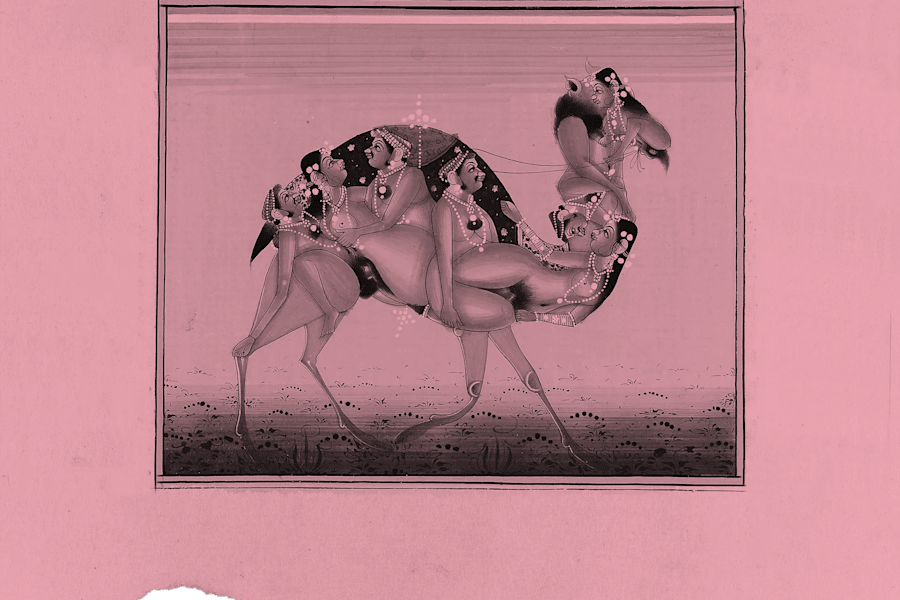An excerpt from "The Future Future"

Adam Thirlwell's novel is a twisted epic of sex, gossip, beauty, and other erotics.
It’s the eighteenth century, and Celine is in trouble...that's how Adam Thirlwell's novel begins, and it ends someplace very far away. The Future Future is a twisted epic in bookstores now; below is an excerpt selected for Feeld readers, a sneak peek until you can get your hands on your own copy.
Meanwhile the performances in theatres and the novels and the epic poems were becoming more and more violent. It so happened that the common obsession of all these art forms was women and it seemed that this wasn’t without meaning, since in general all conversations between women about men were developing a new tone: amazed but also irritable. In these conversations they often found themselves discussing a new theory that was being called a theory of the libertine. The men believed that they were trying to invent an ideal of pleasure and they thought that this ideal found its expression in novels, in letters, or dialogue, a place where every voice could be heard.
These men thought that they were radical but to Celine it felt like it wasn’t enough, or was inconsistent—as if the ideal of transparency concealed something malign. To be a woman had always been to be trapped, but however terrible this condition was it had also been a kind of safety—you were trapped but also cosseted, the way a flute is fitted in its velvet case. And to now try to emerge from that trap turned out to be a trauma of a greater dimension. For of course Celine understood the theory she was supposed to follow. She too wished to pursue happiness in every way possible, but if you didn’t want to pursue the desires of other people, and by people she meant men, very quickly this was seen as evidence of puritanism or even misanthropy, and you were suddenly accused of cruelty, as if the very fact that a man felt something for you conferred an obligation to you to nurse him through the pain because you had caused it, when of course it was entirely controlled by him. It was true that with Claude she had found a possibility of conversation, because after the one time they had slept together they had been able to establish gently and charmingly that it would never happen again, after she had hesitated when Claude approached her at a party with a drink.
-I know, I know, said Claude. - What’s a woman?
-Is this a joke? said Celine.
-Someone who has to say no to men every day, said Claude.
He said it so charmingly that from then on they could like each other without desire, and this perhaps was the best state to achieve with a man.
Still, often now, when everyone thought they were writing about desire and lightness and pleasure when in fact they were writing about pain, Celine felt murderous. One day, reading a new magazine set up by Jacob, his new venture devoted to the urgent and contemporary after the failure of his scripts and poems and philosophical articles, Celine had a premonition.
-Let me explain, she said to him. - I know you want the most modern picture possible. I want it too. But that means I want spaceships and radical politics. And most of all I want the perspective to change. Perhaps also some jokes. Now: is that too much to ask?
The fact that Jacob seemed unable to understand was depressing but somehow less depressing than it might have been before, because she was now able to construct a little rickety space of her own, separate from these traps and disasters, which was the space she was constructing with Marta—small scale and improvised. She understood that to many people, maybe everyone, what they were doing would seem perverse, but she disagreed. There was much more perversity, she thought, in all the varieties of abjection men and women developed between each other.
Marta and Celine used to hang out quietly in the countryside. The countryside was always there. It was a place of pleasure. They lay beside a lake, at the foot of trees on soil they shared with invisible mushrooms pushing through the earth. Leaves were little plastic structures in the sky. By the water it was almost noisy: weeds impeded the water’s slight movement and made eddying scurries and lifts, while within each tree invisible animals made flourishes and forays. Everything was an arrangement of small voices. And yet, she thought, it was also called silence, because none of the noises were made by people.
The less language they used, or the more they just used language as an amusement, the more happiness they pro- duced. In the light mornings they played a game they had invented, a little thing with words and images. Marta picked up one of the magazines and would show Celine a picture, hiding the surrounding words, and Celine would offer a line to go with it. For instance, a naked man stuck in a window, trying to escape from a bathroom window:
-Feelings? Fuck them, said Celine.
Or a woman talking to a man, naked, from the tousled sheets of her bed:
-You are not a beauty queen, she said.
It was very interesting, watching what the words did to the pictures. Something happened between the two which was neither the picture nor the words but both of them at once.
Celine had lived in a certain kind of world for so long, and to discover a way of rejecting it was both surprising and refreshing—like the way, she once told Julia, you push open a door to discover there’s been a rainstorm, and you step out into the amazingly rinsed and electric world.
Their other game was telling their own story to each other.
How did this begin? asked Marta. Celine said that they met at a party, where Marta observed that everything wrong in the world was because of the miseducation of girls, and Celine had thought she seemed so cool. But then what happened? asked Marta. Then they became friends, shrugged Celine, and everyone was always talking about Marta, and that boy, the one with the terrible eye problems. No, it was the dress store, interrupted Marta. They were at the dress store, continued Celine, agreeing with her, they’d been looking at dresses and were waiting for a taxi, it was snowing, the snow was almost black, and Celine had asked if Marta was ever upset by things people said about her, and she’d said no, because no one should ever rely on the affection of other people.
They lay there, talking, sometimes licking each other’s faces very delicately. Celine’s breasts were micropebbled from the breeze. And sometimes Marta bent down and kissed Celine and each time Celine would think how mysterious it was, this moment when two people moved across little borders or assumptions, the way this friendship also sometimes involved their bodies, too. It required great delicacy to move across these little borders.
-Why do you like me? she said. - I’m basically thirteen. I’m not wearing any socks today. I woke up and couldn’t find any socks.
And Marta shook her head subtly no, then they began to kiss again and touch until Marta finally looked away so she could concentrate and even while this was happening Celine thought how much she loved this very neat selfishness in the way Marta acted sexually, and did not mind it because it was with the same concentration that she thought about other people. And Celine thought that if there would ever be a true theory of pleasure and of a person who understood pleasure then in some way this would be it: a person who could think with equal ferocity about the pleasure of another person and their own.


